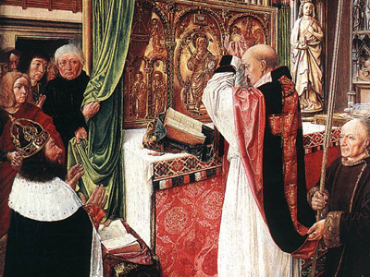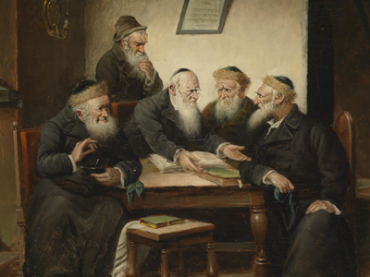Religion
19 and Jeremiah 19
ISBN: 978-1-61143-546-7
Ancient Egyptian leaders sought to preserve the status quo by using not only their military might, but also enlisting magical rituals to help control any perceived threats to their way of life. Biblical leaders also sought to control their respective peoples by means of divine authority, brute force, and/or ritual actions. Examples of ritual actions by Moses and Jeremiah mimic those used by the ancient Egyptians in order to preserve or restore order to their given societies.
$145.00
The Historiography of Music in Global Perspective
Edited by Sam Mirelman
Series: Gorgias Précis Portfolios 9
ISBN: 978-1-61143-669-3
This volume examines the perception of music’s past, in all its historical, geographical and cultural breadth. The wide-ranging collection of papers address the interpretation of past music cultures from the earliest records of antiquity until the present.
$137.00
Eine aegyptische Mess- und Taufliturgie verrmutlich des 6 Jahrhunderts
Edited with an Introduction by Anton Baumstark
Series: Analecta Gorgiana 400
ISBN: 978-1-60724-674-9
Anton Baumstark presents the Arabic text and Latin translation of an Egyptian version of the Testamentum Domini Nostri Jesu Christi. Baumstark discusses the date of the text and compares the content of the liturgical prayers with various contemporary sources.
$40.00
Un recueil de sentences attribué à Isaac le Syrien
Edited with an Introduction by Marius Besson
Series: Analecta Gorgiana 401
ISBN: 978-1-60724-675-6
Marius Besson presents the critical text of two manuscripts containing an apophthegmatic text with sayings attributed to Isaac of Nineveh. The text also includes a separate apparatus with references to parallel texts in various early Christian documents.
$35.00
Le texte grec des récits du moine Anastase sur les saints pères du Sinaï
Edited with an Introduction by François Nau
Series: Analecta Gorgiana 402
ISBN: 978-1-60724-676-3
François Nau collated various manuscripts containing stories about the holy fathers of Sinai and presents here the critical and annotated text. These stories offer otherwise unknown information about St. John Climacus and include useful historical and geographic details.
$37.00
Eine syrische "Liturgie S. Athanasii"
Edited with an Introduction by Anton Baumstark
Series: Analecta Gorgiana 403
ISBN: 978-1-60724-677-0
This Syriac version of the “Liturgy of St. Athanasius” provides a valuable resource for the development of liturgical materials and practices in the Syrian Monophysite tradition. The text includes a critical apparatus and a Latin translation.
$39.00
Le texte grec des récits utiles à l'âme d'Anastase (le Sinaïte)
Edited with an Introduction by François Nau
Series: Analecta Gorgiana 407
ISBN: 978-1-60724-682-4
These eighteen stories pertaining to Anastasius of Mount Sinai include unique information and variations of stories preserved elsewhere. Nau presents the edited Greek text along with an introductory discussion of authorship and sources.
$38.00
Die nichtgriechischen Paralleltexte zum achten Buche der Apostolischen Konstitutionen
Series: Analecta Gorgiana 410
ISBN: 978-1-60724-687-9
Book VIII of the Apostolic Constitutions has one of the most complex transmission histories of any text from the Christian Orient. Anton Baumstark describes various sources for parallel texts in order to explicate its translation history in the Oriental languages.
$39.00
Die armenischen apokryphen Apostelakten I. Das gnostische martyrium Petri
Edited with an Introduction by Paul Vetter
Series: Analecta Gorgiana 411
ISBN: 978-1-60724-688-6
Paul Vetter presents the Armenian text, along with a Greek translation, of the “Gnostic Martyrdom of Peter” from the Apocryphal Acts of the Apostles. The article also includes an appendix in which Vetter describes the manuscripts used in the collation.
$35.00
Der Katholikos Timotheos I und seine Briefe
Translation and Introduction by Oskar Braun
Series: Analecta Gorgiana 412
ISBN: 978-1-60724-689-3
Oskar Braun provides a brief introduction to the life and career of Patriarch Timothy I, including a list of his writings with special attention to his letters and the Syriac text and German translation for five of Timothy’s letters.
$44.00
Die Evangelienexegese der syrischen Monophysiten
Series: Analecta Gorgiana 413
ISBN: 978-1-60724-690-9
Anton Baumstark presents a historical survey of the development of the exegetical methods of the Syriac Orthodox (“Jacobite/Monophysite”) tradition. Baumstark conducts this survey by detailing the influence of various exegetical works through three distinct historical periods.
$41.00
Zwei syrische Dichtungen auf das Entschlafen der allerseligsten Jungfrau
Edited and Translated by Anton Baumstark
Series: Analecta Gorgiana 419
ISBN: 978-1-60724-710-4
Anton Baumstark publishes two memre on the subject of Mary’s passing. The first is attributed to Jacob of Serug and the second to John of Birta. Baumstark also provides a brief introduction to the texts.
$40.00
Griechische Philosophen und ihre Lehren in syrischer Ueberlieferung
Abschnitte aus Theodoros' bar Kônî "Buch der Scholien"
Translation and Introduction by Anton Baumstark
Series: Analecta Gorgiana 421
ISBN: 978-1-60724-712-8
Anton Baumstark publishes here the portion of Theodore bar Koni’s Scholia that deals with the various Greek philosophical schools of thought. Baumstark provides an introduction to the Syriac text and includes a Latin translation.
$37.00
Die syrische "Liturgie" des Kyriakos von Antiocheia
Edited with an Introduction by Karl Kaiser
Series: Analecta Gorgiana 422
ISBN: 978-1-60724-713-5
Kyriakos, Patriarch of Antioch, was an influential figure in the development of the Syriac Monophysite tradition. Karl Kaiser presents here a brief but important survey of his life and publishes the Syriac text of a liturgy attributed to Kyriakos.
$35.00
Koptische Poesie des 10. Jahrhunderts
Translation and Introduction by Hermann Junker
Series: Analecta Gorgiana 428
ISBN: 978-1-60724-734-0
Hermann Junker provides here a thorough discussion of the salient features of the Coptic poetry that flourished in the tenth-century. Following this introduction, Junker provides the Coptic text and German translation of dozens of these poems.
$108.00
Une autobiographie syriaque de Denys l'Aréopagite
Translation and Introduction by Marc-Antoine Kugener
Series: Analecta Gorgiana 429
ISBN: 978-1-60724-735-7
The “Autobiography” of Dionysius the (Pseudo-)Aereopagite exists in two separate recensions found in three manuscripts. Marc-Antoine Kugener publishes here the Syriac text of the two recensions along with an introduction and a German translation.
$43.00
Die Panoplia dogmatica des Euthymios Zigabenos
Untersuchung ihrer Anlage und ihrer Quellen, ihres Inhaltes und ihrer Bedeutung
Series: Analecta Gorgiana 433
ISBN: 978-1-60724-739-5
Jacob Wickert offers one of the most thorough discussions of Euthymios Zigabenus ever produced, including an introduction to his life and a detailed discussion of the contents of Euthymios’s compendium of heresies, the Panoplia Dogmatica.
$56.00
Der Drachenkampf des heiligen Theodor
Edited with an Introduction by Willy Hengstenberg
Series: Analecta Gorgiana 436
ISBN: 978-1-60724-773-9
The ancient myth of a hero who slays a mythical beast worked its way into the lore of early Christianity. Willy Hengstenberg discusses here the sources for the dragon-slaying legend attributed to two separate fourth-century figures named Theodore.
$46.00
Une lettre de Sévère d'Antioche à la diaconesse Anastasie
Translation and Introduction by Marius Chaîne
Series: Analecta Gorgiana 437
ISBN: 978-1-60724-774-6
Marius Chaîne publishes the Coptic text and French translation of a letter attributed to Severus of Antioch and addressed to the deaconess Anastasia. In the introduction, Chaîne discusses the attribution to Severus and the exegetical method displayed within the letter.
$37.00
L'Octoëchos Syrien
Series: Analecta Gorgiana 438
ISBN: 978-1-60724-775-3
Oriental liturgical experts Jules Jeannin and Julien Puyade survey the historical development and musical features of the Greek Octoechos musical tradition as it was adopted, adapted, and utilized in the Syriac tradition.
$41.00
Untersuchungen zur syrischen Überlieferung der Siebenschläferlegende und Die älteste Gestalt der Sie
Edited and Translated by Arthur Allgeier
Series: Analecta Gorgiana 440
ISBN: 978-1-60724-777-7
Arthur Allgeier publishes here two articles concerning the “Legend of the Seven Sleepers” in the Syriac tradition. The first article includes a discussion of the text’s transmission history and the second includes the Syriac text, German translation, and apparatus.
$72.00
Die Anaphora des hl. Jakobus, des Bruders der Herrn
Nach dem Ms. aeth. 74 der Bibliothèque zu Paris
Edited and Translated by Sebastian Euringer
Series: Analecta Gorgiana 441
ISBN: 978-1-60724-778-4
Sebastian Euringer publishes here the Ethiopic text and German translation of an anaphora attributed to James, the brother of Jesus.
$36.00
Iulianos der Abtruennige
Syrische Erzaehlungen
Edited by Johann G. E. Hoffmann
Series: Syriac Studies Library 13
ISBN: 978-1-60724-794-4
This work contains two Syriac texts bearing on the (in)famous Julian the Apostate, both in terms of history and religion. The book includes a critical apparatus to the Syriac texts and indices of proper names and Greek words.
$178.00
Un évêque-poète au Ve et au VIe siècles
Jacques de Saroug: sa vie, son temps, ses oeuvres, ses croyances
Series: Syriac Studies Library 20
ISBN: 978-1-60724-819-4
In this important work on Jacob of Sarug, Martin examines what is known of the poet’s life, looks at his lasting influence, offers a number of extracts from Jacob’s homilies and letters in French, and discusses his orthodoxy.
$143.00
Inedita Syriaca
Eine Sammlung syrischen Übersetzungen von Schriften griechischer Profanliteratur
Edited with an Introduction by Eduard Sachau
Series: Syriac Studies Library 21
ISBN: 978-1-60724-820-0
Using manuscripts from the British Museum, Sachau here presents a number of unique Syriac texts translated from Greek, including philosophical, medical, and maxim texts. The appendix includes astronomical texts from Sergius of Reshaina and Severus Sebokt.
$154.00
Filter by
Filter by price
Filter by manufacturer



























